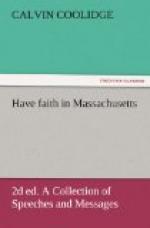If there are any who doubt that our institutions, formed in those days, did not establish a peoples’ government, let them study the action of the Massachusetts Convention which ratified the Federal Constitution in 1788. Presiding over it was the popular patriot Governor John Hancock. On the floor sat Samuel Adams, who had been the father of the Revolution, preeminent champion of the liberty of the people. Such an influence had he, that his assertion of satisfaction, was enough to carry the delegates. Like a majority of the members he came opposed to ratification. Having totally thrown off the authority of foreign power, they came suspicious of all outside authority. Besides there were eighteen members who had taken part in Shays’s Rebellion, so hostile were they to the execution of all law. Mr. Adams was finally convinced by a gathering of the workingmen among his constituents, who exercised their constitutional right of instructing their representatives. Their opinion was presented to him by Paul Revere. “How many mechanics were at the Green Dragon when these resolutions were passed?” asked Mr. Adams. “More, sir, than the Green Dragon could hold.” “And where were the rest?” “In the streets, sir.” “And how many were in the streets?” “More than there are stars in the sky.” This is supposed to have convinced the great Massachusetts tribune that it was his duty to support ratification.
There were those, however, who distrusted the Constitution and distrusted its proponents. They viewed lawyers and men of means with great jealousy. Amos Singletary expressed their sentiments in the form of an argument that has not ceased to be repeated in the discussion of all public affairs. “These lawyers,” said he, “and men of learning and moneyed men that talk so finely and gloss over matters so smoothly, to make us poor illiterates swallow the pill, expect to get into Congress themselves. They mean to be managers of the Constitution. They mean to get all the money into their hands and then they will swallow up us little folk, like the great Leviathan, Mr. President: yes, just like the whale swallowed up Jonah.” In the convention sat Jonathan Smith, a farmer from Lanesboro. He had seen Shays’s Rebellion in Berkshire. There had been no better example of a man of the people desiring the common good.
“I am a plain man,” said Mr. Smith, “and am not used to speak in public, but I am going to show the effects of anarchy, that you may see why I wish for good government. Last winter people took up arms, and then, if you went to speak to them, you had the musket of death presented to your breast. They would rob you of your property, threaten to burn your houses, oblige you to be on your guard night and day. Alarms spread from town to town, families were broken up; the tender mother would cry, ‘Oh, my son is among them! What shall I do for my child?’ Some were taken captive; children taken out of their schools and carried away.... How dreadful was




